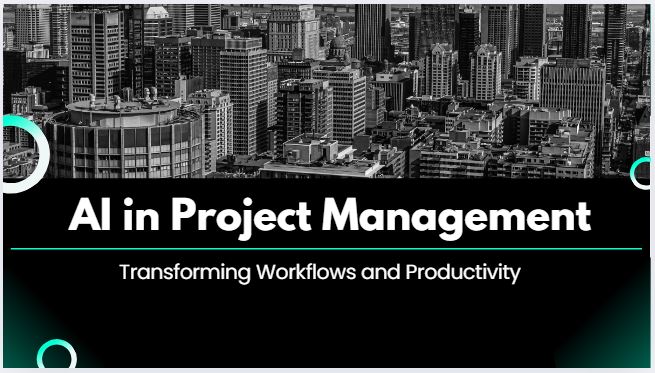![What is Project Management? The Complete Guide [2025]](https://blog.mitsde.com/wp-content/uploads/2025/02/What-is-Project-Management-The-Complete-Guide-2025.jpg)
Introduction
In today’s fast-paced business world, project management is the key to turning ideas into reality. Whether it’s launching a new product, building infrastructure, or developing software, effective project management ensures successful execution. But what exactly is project management, and why is it so important in 2025-26? Let’s explore!
What is Project Management?
Project management is the process of planning, executing, monitoring, and completing a project within a defined timeframe, scope, and budget. It involves a structured approach to achieving specific goals while managing resources, risks, and stakeholders.
A project is a temporary endeavor undertaken to create a unique product, service, or result. Unlike ongoing operations, projects have a clear start and end date.
Key Components of Project Management
To successfully manage a project, professionals focus on the following components:
1. Project Scope
- Defines the project’s objectives, deliverables, and constraints.
- Avoids scope creep (uncontrolled expansion of the project’s scope).
2. Project Timeline
- Establishes a clear schedule with milestones and deadlines.
- Uses tools like Gantt charts and timelines for better tracking.
3. Project Budget
- Allocates financial resources efficiently.
- Balances cost control with quality requirements.
4. Risk Management
- Identifies potential risks and mitigation strategies.
- Ensures contingency plans for uncertainties.
5. Stakeholder Management
- Engages and communicates with all involved parties.
- Ensures alignment of project goals with stakeholder expectations.
Popular Project Management Methodologies
Different industries use various project management methodologies to improve efficiency.
Here are the top methodologies in 2025-26:
1. Agile
- Best for software development and iterative projects.
- Focuses on flexibility, collaboration, and continuous improvement.
2. Waterfall
- A linear approach where each phase must be completed before moving to the next.
- Commonly used in construction and manufacturing.
3. Scrum
- A subset of Agile, focused on short sprints and team collaboration.
- Great for product development and software teams.
4. Kanban
- A visual workflow management method that enhances efficiency.
- Used in industries like manufacturing, logistics, and IT.
5. PRINCE2 (Projects IN Controlled Environments)
- A structured approach widely used in government and corporate projects.
The Role of a Project Manager
A project manager is responsible for planning, organizing, and overseeing the project to ensure success. Their key responsibilities include:
- Defining the project’s goals and scope.
- Managing resources, budgets, and timelines.
- Communicating with stakeholders and team members.
- Identifying and mitigating risks.
- Ensuring project completion within quality standards.
Essential Skills for a Project Manager in 2025-26
- Leadership and Team Management – Guiding teams towards project success.
- Communication Skills – Effectively engaging with stakeholders.
- Problem-Solving – Quickly addressing challenges and roadblocks.
- Time Management – Ensuring timely completion of tasks.
- Technical Knowledge – Familiarity with project management software and industry-specific tools.
Best Project Management Tools in 2025-26
To manage projects effectively, professionals rely on advanced project management tools. Some of the best tools include:
- Trello – Ideal for Kanban-based task tracking.
- Asana – Great for team collaboration and workflow automation.
- Microsoft Project – Best for enterprise-level planning.
- Monday.com – Popular for flexible project tracking.
- JIRA – Preferred by Agile and Scrum teams.
Future Trends in Project Management (2026 & Beyond)
As technology evolves, project management trends continue to shape the industry. Here’s what’s driving change in 2025-26:
1. AI & Automation in Project Management
- AI-driven analytics help predict risks and optimize workflows.
- Automation reduces manual tasks, improving efficiency.
2. Remote and Hybrid Project Management
- Virtual collaboration tools make remote project management seamless.
- Hybrid teams require new communication and tracking methods.
3. Sustainable Project Management
- Green project management focuses on eco-friendly and sustainable initiatives.
- Organizations are integrating sustainability metrics into project evaluation.
4. Data-Driven Decision-Making
- Big Data and analytics provide real-time insights for better decision-making.
- Predictive analytics help in risk management and resource allocation.
Why Project Management is Critical for Businesses
Project management is the backbone of successful business operations.
Here’s why it’s crucial:
- Enhances efficiency by optimizing resources and reducing waste.
- Improves collaboration across teams and stakeholders.
- Reduces risks by identifying potential issues early.
- Ensures customer satisfaction through timely and high-quality project delivery.
Conclusion
Project management is no longer just about meeting deadlines—it’s about driving innovation, efficiency, and success. Whether you’re an aspiring project manager or a business leader, mastering project management skills will be crucial in 2025-26 and beyond.
Are you looking to enhance your project management expertise? Consider enrolling in a PGDM in Project Management to gain industry-relevant skills and certification.



